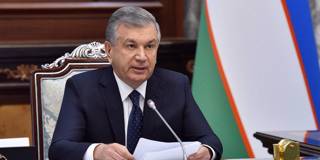While Uzbek President Shavkat Mirziyoyev’s government has implemented some reforms, it has gone only as far as a system of “managed freedom.” There is room for some dissent, though how much is not always clear, and the state is still quick to revert to repressive measures. That is not good enough.
LONDON – On July 9, Uzbek blogger Miraziz Bazarov posted an open letter to the International Monetary Fund and the Asian Development Bank on Facebook, highlighting the likelihood that the government was misusing COVID-19 relief funds. Bazarov’s allegation proved to be justified, but he paid a price for making it: he was summoned to the State Security Service (SGB) office for questioning.

LONDON – On July 9, Uzbek blogger Miraziz Bazarov posted an open letter to the International Monetary Fund and the Asian Development Bank on Facebook, highlighting the likelihood that the government was misusing COVID-19 relief funds. Bazarov’s allegation proved to be justified, but he paid a price for making it: he was summoned to the State Security Service (SGB) office for questioning.